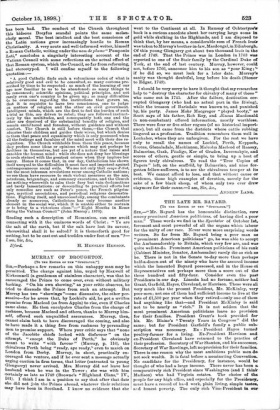MURRAY OF BROUGHTON.
[To THE EDITOR OF THY "SPECTATOR."] "Sin,—Perhaps a few remarks on this unhappy man may be permitted. The charge against him, urged by Maxwell of Kirkconnell (a gentleman of stainless character), was that he encouraged the Prince to come over, even without military backing. "On his own showing," as your critic observes, he tried to dissuade the Prince from such an attempt. But Murray has two "showings "—one dissuasive, the other per- suasive—for he avers that by Lochiel's aid, he got a written promise from Macleod (as from Appin) to rise, even if Charles came alone. He then exculpates Charles from the charge of rashness, because Macleod and others, thanks to Murray him- self, offered such unqualified assurances. Murray, then, cannot claim both to have discouraged the coming, and also to have made it a thing free from rashness by persuading men to promise support. Where your critic says that "none of the Jacobite chiefs looked with disfavour" on the attempt, "except the Duke of Perth," he obviously meant to write "with favour" (Murray, p. 116), the 'chivalrous Perth being "ready, aye ready," even to march on London from Derby. Murray, in short, practically en- couraged the venture, and if he ever sent a message actually urging caution in firm terms, that letter (entrusted to young 'Glengarry) never arrived. Mrs. Murray did not leave her husband when he was in the Tower ; she was with him certainly as late as 1749 (Browne's "Highland Clans," IV., 101). I think I am in a position to say that after that date she did not join the Prince abroad, whatever their relations easy have been in Scotland. I know no evidence that she went to the Continent at all. In Ramsay of Ochtertyre'S book is a curious anecdote about her carrying large sums in gold while skulking in the Highlands, and I am disposed to think that, by her means, a considerable sum of French /ouis was taken to Murray's brother-in-law, Macdougal, in Edinburgh. Of this young Glengarry got about two thousand /ouis in the end of 1749. That the Prince was in London in 1763 was reported to one of the Stair family by the Cardinal Duke of York, at the end of last century. Murray, however, could not, before 1766, announce him to his son as "your King ; if he did so, we must look for a later date. Murray's sanity was thought doubtful, long before his death (Stonor to Edgar, 1749).
I should be very sorry to have it thought that my researches help to "destroy the character for chivalry of many of those" who came out in 1745. After the failure, destitution cor- rupted Glengarry (who had no actual part in the Rising), while the treason of Barisdale was known to, and punished by, his party. James Mohr Macgregor "played booty," as Scott says of his father, Rob Roy, and 2Eneas Macdonald (a non-combatant) offered information, mostly worthless. There were four or five other rogues (of no historical import- ance), but all came from the districts where cattle robbing lingered as a profession. Tradition remembers them well in Lochaber, where they are nnforgiven. For the rest we have only to recall the names of Lochiel, Perth, Keppoch, Scotus, Glenaladale, Mackinnon, Malcolm Macleod of Raasay, Balmerino, Gask, Pitsligo, Ker of Graden, Invernalayle, and scores of others, gentle or simple, to bring up a host of figures truly chivalrous. To read the "True Copies of Papers" left, on the scaffold, by Baltnerino, and nine for- gotten fellow-sufferers, is to see the chivalrous temper at its best. We cannot afford to lose, and that without cause or evidence, those high examples of devotion, merely for the sake of a few black sheep, of whom only two ever drew claymore for their cause.—I am, Sir, &c., ANDREW LANG.






































 Previous page
Previous page